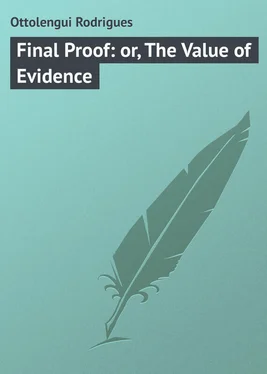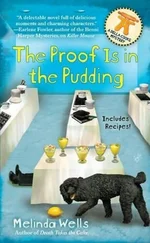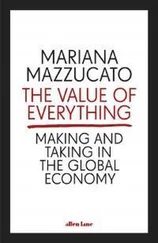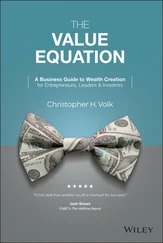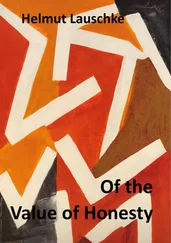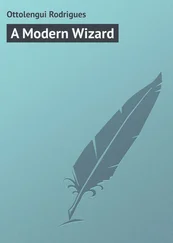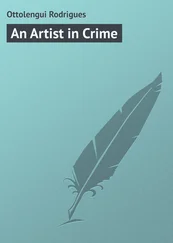Rodrigues Ottolengui - Final Proof - or, The Value of Evidence
Здесь есть возможность читать онлайн «Rodrigues Ottolengui - Final Proof - or, The Value of Evidence» — ознакомительный отрывок электронной книги совершенно бесплатно, а после прочтения отрывка купить полную версию. В некоторых случаях можно слушать аудио, скачать через торрент в формате fb2 и присутствует краткое содержание. Жанр: foreign_prose, на английском языке. Описание произведения, (предисловие) а так же отзывы посетителей доступны на портале библиотеки ЛибКат.
- Название:Final Proof: or, The Value of Evidence
- Автор:
- Жанр:
- Год:неизвестен
- ISBN:нет данных
- Рейтинг книги:3 / 5. Голосов: 1
-
Избранное:Добавить в избранное
- Отзывы:
-
Ваша оценка:
- 60
- 1
- 2
- 3
- 4
- 5
Final Proof: or, The Value of Evidence: краткое содержание, описание и аннотация
Предлагаем к чтению аннотацию, описание, краткое содержание или предисловие (зависит от того, что написал сам автор книги «Final Proof: or, The Value of Evidence»). Если вы не нашли необходимую информацию о книге — напишите в комментариях, мы постараемся отыскать её.
Final Proof: or, The Value of Evidence — читать онлайн ознакомительный отрывок
Ниже представлен текст книги, разбитый по страницам. Система сохранения места последней прочитанной страницы, позволяет с удобством читать онлайн бесплатно книгу «Final Proof: or, The Value of Evidence», без необходимости каждый раз заново искать на чём Вы остановились. Поставьте закладку, и сможете в любой момент перейти на страницу, на которой закончили чтение.
Интервал:
Закладка:
"That last line reads like a challenge to the gentlemen of your profession," said Mr. Mitchel to Mr. Barnes as he put down the paper.
"I needed no such spur to urge me to undertake to unravel this case, which certainly has most astonishing features."
"Suppose we enumerate the important data and discover what reliable deduction may be made therefrom."
"That is what I have done a dozen times, with no very satisfactory result. First, we learn that a man is found in the river upon whose face there is a curious distinguishing mark in the form of one of the rarest of skin diseases. Second, a man has recently died who was similarly afflicted. The attending physician declares upon examination that the body taken from the river is the body of his patient. Third, the family agree that this identification is correct. Fourth, this second dead man was cremated. Query, how can a man's body be cremated, and then be found whole in the river subsequently? No such thing has been related in fact or fiction since the beginning of the world."
"Not so fast, Mr. Barnes. What of the Phœnix?"
"Why, the living young Phœnix arose from the ashes of his dead ancestor. But here we have seemingly a dead body re-forming from its own ashes, the ashes meanwhile remaining intact and unaltered. A manifest impossibility."
"Ah; then we arrive at our first reliable deduction, Mr. Barnes."
"Which is?"
"Which is that, despite the doctors, we have two bodies to deal with. The ashes in the vault represent one, while the body at the Morgue is another."
"Of course. So much is apparent, but you say the body at the Morgue is another, and I ask you, which other?"
"That we must learn. As you appear to be seeking my views in this case I will give them to you, though of course I have nothing but this newspaper account, which may be inaccurate. Having concluded beyond all question that there are two bodies in this case, our first effort must be to determine which is which. That is to say, we must discover whether this man, Rufus Quadrant, was really cremated, which certainly ought to be the case, or whether, by some means, another body has been exchanged for his, by accident or by design, and if so, whose body that was."
" If it turns out that the body at the Morgue is really that of Mr. Quadrant, then, of course, as you say, some other man's body was cremated, and – "
"Why may it not have been a woman's?"
"You are right, and that only makes the point to which I was about to call your attention more forcible. If an unknown body has been incinerated, how can we ever identify it?"
"I do not know. But we have not arrived at that bridge yet. The first step is to reach a final conclusion in regard to the body at the Morgue. There are several things to be inquired into, there."
"I wish you would enumerate them."
"With pleasure. First, the autopsy is said to have shown that the man died a natural death, that is, that disease, and not one of his fellow-beings, killed him. What disease was this, and was it the same as that which caused the death of Mr. Quadrant? If the coroner's physicians declared what disease killed the man, and named the same as that which carried off Mr. Quadrant, remembering that the body before them was unknown, we would have a strong corroboration of the alleged identification."
"Very true. That will be easily learned."
"Next, as to this lichen. I should think it important to know more of that. Is it because the two cases are examples of the same rare variety of the disease, or was there something so distinct about the location and area or shape of the diseased surface, that the doctor could not possibly be mistaken? – for doctors do make mistakes, you know."
"Yes, just as detectives do," said Mr. Barnes, smiling, as he made notes of Mr. Mitchel's suggestions.
"If you learn that the cause of death was the same, and that the lichen was not merely similar but identical, I should think that there could be little reason for longer doubting the identification. But if not fully satisfied by your inquiries along these lines, then it might be well to see the family of Mr. Quadrant, and inquire whether they too depend upon this lichen as the only means of identification, or whether, entirely aside from that diseased spot, they would be able to swear that the body at the Morgue is their relative. You would have in connection with this inquiry an opportunity to ask many discreet questions which might be of assistance to you."
"All of this is in relation to establishing beyond a doubt the identity of the body at the Morgue, and of course the work to that end will practically be simple. In my own mind I have no doubt that the body of Mr. Quadrant is the one found in the water. Of course, as you suggest, it will be as well to know this rather than merely to think it. But once knowing it, what then of the body which is now ashes?"
"We must identify that also."
"Identify ashes!" exclaimed Mr. Barnes. "Not an easy task."
"If all tasks were easy, Mr. Barnes," said Mr. Mitchel, "we should have little need of talent such as yours. Suppose you follow my advice, provided you intend to accept it, as far as I have indicated, and then report to me the results."
"I will do so with pleasure. I do not think it will occupy much time. Perhaps by luncheon, I – "
"You could get back here and join me. Do so!"
"In the meanwhile shall you do any – any investigating?"
"I shall do considerable thinking. I will cogitate as to the possibility of a Phœnix arising from those ashes."
Leaving Mr. Mitchel, Mr. Barnes went directly to the office of Dr. Mortimer, and after waiting nearly an hour was finally ushered into the consulting-room.
"Dr. Mortimer," said Mr. Barnes, "I have called in relation to this remarkable case of Mr. Quadrant. I am a detective, and the extraordinary nature of the facts thus far published attracts me powerfully, so that, though not connected with the regular police, I am most anxious to unravel this mystery if possible, though, of course, I should do nothing that would interfere with the regular officers of the law. I have called, hoping that you might be willing to answer a few questions."
Читать дальшеИнтервал:
Закладка:
Похожие книги на «Final Proof: or, The Value of Evidence»
Представляем Вашему вниманию похожие книги на «Final Proof: or, The Value of Evidence» списком для выбора. Мы отобрали схожую по названию и смыслу литературу в надежде предоставить читателям больше вариантов отыскать новые, интересные, ещё непрочитанные произведения.
Обсуждение, отзывы о книге «Final Proof: or, The Value of Evidence» и просто собственные мнения читателей. Оставьте ваши комментарии, напишите, что Вы думаете о произведении, его смысле или главных героях. Укажите что конкретно понравилось, а что нет, и почему Вы так считаете.
